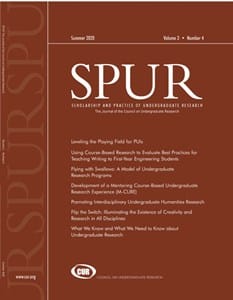SPUR (2020) 3 (4): https://doi.org/10.18833/spur/3/4/4 Abstract:
To assess what questions are already answered and what still needs to be discovered about the high-impact practice of undergraduate research (UR), the authors conducted a mixed-methods study, including a systematic analysis of literature that assessed the impact of UR, and interviewed faculty and administrators actively engaged in UR. Findings demonstrated that most studies on UR have focused on STEM fields and student outcomes. Fewer studies have examined other disciplines or other outcomes such as the impact of UR on faculty or institution. Despite ample research that demonstrates outcomes associated with UR, more work is needed to establish a causal relationship between UR and these outcomes, to diversify the topics and scope of scholarship on UR, and to demonstrate the far-ranging impacts of UR.
More Articles in this Issue
- ‐ Rebecca M. Jones, Issue Editor
SPUR (2020) 3 (4): https://doi.org/10.18833/spur/3/4/11 - Practice‐ Heather E. Dillon
SPUR (2020) 3 (4): https://doi.org/10.18833/spur/3/4/7 Abstract:Undergraduate research has been shown to provide numerous benefits to students. In recent years an effort to scale the experience has led to development of course-based undergraduate research that often focuses on data collection or analysis. This article describes the design of a mentoring course-based undergraduate research experience (M-CURE) that focuses on the publication and career growth aspects of the research experience. A survey of students who completed the course indicated that they appreciated both the publication and mentoring facets of the course. The first three cohorts of the M-CURE course have resulted in 83 percent of students with a viable paper for publication. Eighty-one percent of the students indicated that they were extremely or somewhat likely to attend graduate programs in the next five years.
- Assessment‐ Rachel Hayes-Harb, Mark St. Andre, and Megan Shannahan
SPUR (2020) 3 (4): https://doi.org/10.18833/spur/3/4/10 Abstract:The authors have developed a set of undergraduate research learning outcomes that address the traditions of research and mentoring across campus. Achievement of these outcomes is assessed at annual, institution-wide, undergraduate research events by employing a poster presentation evaluation rubric and deploying graduate students, postdoctoral scholars, and faculty as ad hoc raters. Between April 2018 and April 2019, 2,721 rubrics evaluating 803 undergraduate research posters by 436 raters were collected. Students participating in the one-semester funded and mentored undergraduate research program performed significantly higher on all four quantified learning outcomes than did nonparticipants. It was further found that disciplines exhibited different profiles of relative strength and weakness with respect to the various learning outcomes. Together, these findings inform future programmatic decision-making at the institution.


